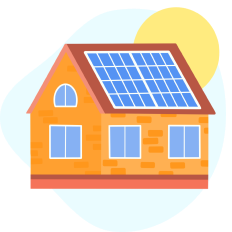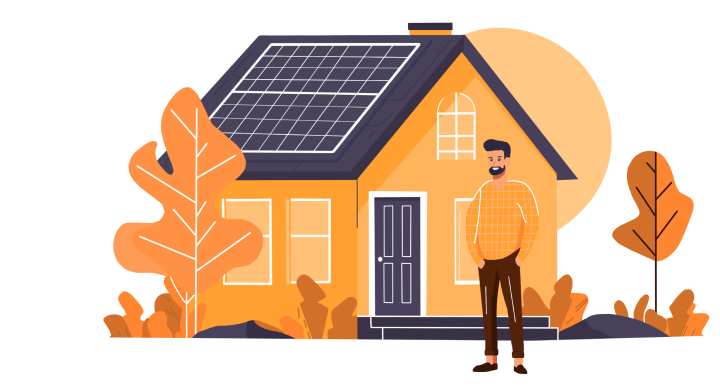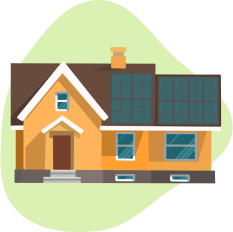The cost of solar panel installation can be daunting at first glance, but breaking it down makes everything clearer.
Let Solar Energy Host put your “How much do solar panels cost?” question to rest. We bring you this article on everything you need to know about the cost to install solar panels at home. Through us at Solar Energy Host, you can quickly and easily make a solar panel price comparison from top local providers, ensuring you get the ideal deal tailored to your needs.
Get to know more about us and the residential solar cost below:
Fact #1: The type of solar panels you choose will directly affect installation costs.
Higher-efficiency solar panels offer greater long-term savings.
Higher-efficiency solar panels typically come with a higher initial price tag, but they generate more electricity, which can significantly reduce your energy bills over time.
By opting for high-efficiency panels, you might face a larger upfront expense compared to traditional panels. However, these panels produce more electricity per square foot, which can dramatically lower your energy bills month after month. This means that although the cost of solar panel installation is higher initially, the long-term savings on your electricity bills can make this investment very worthwhile.
Certain roof designs incur higher installation costs.
Unique roof designs or pre-existing conditions might necessitate specialized mounting systems, increasing your total solar power installation cost.
For example, if your roof has a steep pitch or is covered in tiles rather than shingles, it may require specific mounting solutions. A professional assessment can identify these conditions upfront, so you're clear on what additional costs may arise with your rooftop solar panels.
Fact #2: Installation costs depend on labor, equipment and permits.
Labor costs differ based on location.
The cost of labor for solar installation varies by region.
For example, in metropolitan areas, where the cost of living is higher, you can expect labor expenses to be on the higher end. Conversely, in rural or less populated regions, labor costs tend to be lower, which can make a significant difference in your overall budget. Understanding the local labor market is crucial because it helps you set realistic financial expectations.
When budgeting to cover the cost of solar panel installation, consider labor costs in your specific area.
Some homes require inverters.
Your home solar energy system might need additional components like inverters and batteries.
Inverters are essential because they convert the DC (direct current) electricity generated by your panels into AC (alternating current) electricity, which is what most home appliances use. Batteries, on the other hand, store excess energy generated during sunny days, allowing you to use them when the sun isn't shining.
Both of these components can increase the upfront cost of installing solar panels but are critical for maximizing solar panel efficiency and reliability.
Fact #3: Incentives and financing options can significantly lower installation costs.
Government incentives can reduce solar installation costs.
Federal tax credits, such as the Investment Tax Credit (ITC), can cut your upfront cost of solar panel installation by a meaningful percentage. State and local rebates vary but can offer substantial solar energy savings depending on where you live. These programs aim to encourage renewable energy adoption by easing the financial barriers for homeowners.
Taking advantage of these incentives allows you to save significantly on solar panel installation.
Financing options make solar more accessible.
Financing options can spread the cost of installing solar panels over time.
Even some of the best solar panel installers provide loan or lease agreements that break down the total cost into manageable monthly payments. This can be especially beneficial if you're hesitant about a large upfront investment but are keen on the long-term benefits of solar energy. By choosing a financing plan, you can start enjoying lower electricity bills while paying off the system gradually.
Spread-out payments make solar energy more accessible without a financial strain.
Fact #4: Solar Energy Host makes finding the right solar installer easy.
Solar Energy Host connects you with top local solar providers for competitive quotes.
With Solar Energy Host, you can quickly find and compare quotes from top-rated solar power installers in your area, ensuring you get the best deal without any hassle.
Our platform simplifies your search, providing access to trusted providers so you can make an informed decision. By entering your basic information, you'll instantly receive multiple quotes from reputable installers near you. This not only saves time but also grants peace of mind, ensuring you're working with vetted professionals.
Finding the right solar installer has never been this straightforward and reliable.
Frequently Asked Questions (FAQ)
What factors affect the cost of solar panel installation?
Several factors influence the total cost of solar panel installation. The type of solar panels you choose can significantly impact the initial investment. The size of your solar system also matters; a larger system will naturally cost more but can offset a higher portion of your electricity needs. Additional elements such as inverters, batteries, and specialized mounting systems can all add to the installation cost.
Keep in mind that besides the initial solar install cost, you may have to pay for solar panel maintenance from time to time to keep your system running efficiently.
How long does it take for solar panels to pay for themselves?
One of the best benefits of installing solar panels is that it will eventually pay for itself. The payback period for the cost of solar panel installation typically ranges from four to seven years.
Your location plays a big role, however; areas with high electricity rates and abundant sunlight can generally see faster returns on investment. Energy consumption patterns and the size of your solar system also impact the payback period, with larger systems typically offering quicker returns.
Can I get a tax credit for installing solar panels?
It's possible to get tax credits to significantly reduce the upfront cost of solar installations, making it easier to afford the initial investment. Additionally, some states offer their own rebate programs, adding another layer of financial support for homeowners looking to go solar. These government-backed incentives aim to make renewable energy more financially viable for the average household.
Take the first step with Solar Energy Host.
Solar Energy Host is your trusted partner in harnessing the power of the sun.
Our straightforward and secure platform connects you with top local providers, ensuring the most competitive quotes for solar panel installations. Enter your basic information, compare quotes, and choose the best offer tailored to your needs. Start saving on the cost of solar panel installation now and join countless homeowners who have switched to a sustainable future with Solar Energy Host.
Get a free cost estimate today!




















